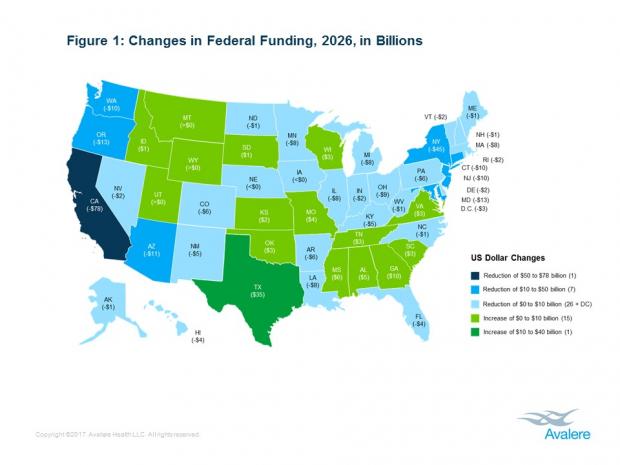The Obamacare replacement bill now being considered in the Senate would reduce federal funding to states for health care by $215 billion through 2026, and those cuts would shoot up to more than $4 trillion through 2036, according to a new analysis by consulting firm Avalere Health. The key details:
What It Means for States: The analysis found that the bill’s approach to Medicaid financing, which would award block grants to states and implement a per capita cap, would reallocate federal money, creating near-term winners and losers. Thirty-four states and the District of Columbia would see funding reductions by 2026, with states that expanded Medicaid under Obamacare being hardest hit. Seven states that would lose more than $10 billion each, with California losing $78 billion and New York funding dropping by $45 billion.
The block grant funding in the bill expires in 2026, and Congress would have to re-appropriate money for the block grants to continue. “The ability of the Congress to appropriate additional funding is uncertain and could be constrained by the need to offset the cost,” the report says. Without that renewed funding, by 2036 all states would have their funding reduced compared with the current law.

Other Winners and Losers: “The bill creates a financial incentive for states to direct coverage to very low-income residents near or below the poverty line, potentially at the expense of lower-middle-income individuals who currently receive exchange subsidies,” Avalere’s Chris Sloan said. Separately, analysts at The Commonwealth Fund and the liberal Center for American Progress found that 32 million fewer people would have health coverage after 2026.
Why It Matters: The Avalere estimate may be the best available given that the non-partisan Congressional Budget Office said this week it would only be able to provide a partial assessment of the bill’s effects by early next week and would require at least several weeks to evaluate the legislation’s potential effects on the deficit, health insurance coverage levels and premiums.
The figures are sure to ramp up criticism of the bill, which would repeal Obamacare’s subsidies for health coverage in the individual market and its expansion of Medicaid benefits for low-income Americans, among other things. Health care groups, a number of governors and even talk show host Jimmy Kimmel have come out against the bill as Senate Republicans have worked to round up the 50 votes required to pass it.





